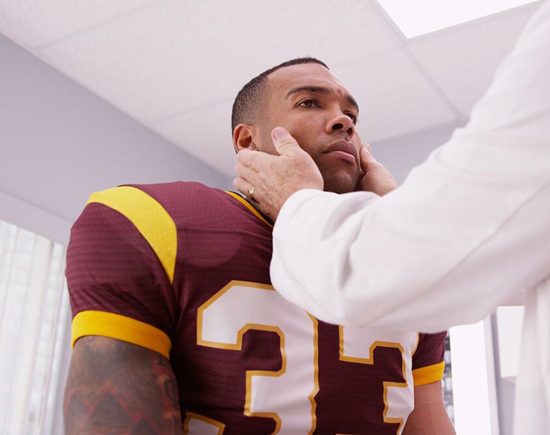Expert Concussion Management & Recovery Services in Austin
Book Your Appointment

When to Use Concussion Testing?
- You play a contact sport, such as football, soccer, wrestling, etc., you should receive a baseline concussion assessment.
- You suffered a potential head/neck trauma and did not get a baseline testing prior to the start of the season.
- You have had several concussions in the past and are worried about long term complications.
- You do not play a sport but have had a recent head injury and want to evaluate your cognitive abilities.
- You are the parent of an athlete and want to make sure their brain is protected.
The best way to manage concussions is to conduct a baseline test prior to the sports season starting. Then if there is a head injury, repeat the test for comparison. By having a comparison between the athlete’s brain functioning before and after the concussion, the clinician is able to make a better evaluation.
Concussions are one of the most common and difficult to manage injuries seen in sports today. News of these injuries, and the sometimes chronic and serious outcomes that follow, have been making headlines across the country. According to the Centers for Disease Control and Prevention, between 1.6 million and 3.8 million brain injuries occur in sports each year – and 63,000 occur in high school athletes alone. With recent advances in neuroscience, sports medicine clinicians are discovering new and better methods to protect your brain health.
Sports concussion experts have agreed that the diagnosis of acute concussion usually involves the assessment of clinical symptoms, physical signs, behavior, balance, sleep and cognition. Just like professional sports physicians, the team at Medicine in Motion uses computerized testing to detect when an athlete is suffering from a concussion. This tool, along with a physician evaluation, can also determine when the concussion has resolved, thereby allowing an athlete to safely return to play.

Concussion Testing FAQs
While not all concussions can be prevented, there are steps you can take to reduce your risk. This includes using proper safety equipment, following safe play guidelines, and getting a baseline concussion assessment before the sports season starts. It’s also crucial to report any potential head injuries immediately and to avoid returning to play too soon after a concussion.
Yes, concussions can have long-term complications. These can include cognitive issues like memory problems, physical symptoms like headaches, and emotional issues like depression. That’s why it’s important to get a proper evaluation and follow a comprehensive treatment plan if you’ve had a concussion.
In sports medicine, concussions are usually diagnosed through the assessment of clinical symptoms, physical signs, behavior, balance, sleep, and cognition. This can involve a combination of physician evaluation and computerized testing. By comparing an athlete’s brain functioning before and after a potential concussion, clinicians can make a more accurate evaluation.
One of the best ways to protect your brain while playing sports is to use proper safety equipment and follow safe play guidelines. Additionally, getting a baseline concussion assessment before the sports season starts can help in the management of potential concussions. It’s also important to report any potential head injuries to your coach and medical professional as soon as possible.
Sports medicine can help protect brain health through the use of advanced neuroscience techniques and tools. This includes conducting baseline concussion assessments before the sports season starts and using computerized testing to detect when an athlete is suffering from a concussion. These tools, along with physician evaluation, can also determine when the concussion has resolved, thereby allowing an athlete to safely return to play.
Concussions are one of the most common and difficult to manage injuries seen in sports today. According to the Centers for Disease Control and Prevention, between 1.6 million and 3.8 million brain injuries occur in sports each year, and 63,000 occur in high school athletes alone. These injuries can have serious and sometimes chronic outcomes.
A baseline concussion assessment typically involves a series of tests that evaluate your learning and memory skills, ability to pay attention or concentrate, and how quickly you can think and solve problems. These tests can offer healthcare professionals the best insight into how your brain works when you’re healthy. Then, if you have a concussion, they can compare your post-injury test results to your baseline to see if your brain function has changed.
A sports medicine specialist uses a combination of physician evaluation and computerized testing to determine when an athlete can safely return to play after a concussion. By comparing the athlete’s brain functioning before and after the concussion, the clinician can evaluate when the concussion has resolved. It’s important to note that return to play should always be gradual and closely monitored.
The recovery time from a concussion can vary greatly depending on the individual and the severity of the concussion. Some people recover within hours, while others may take several weeks. During recovery, it’s important to rest, avoid activities that might worsen symptoms, and follow your healthcare provider’s recommendations.
Signs and symptoms of a concussion can include headache, confusion, lack of coordination, memory loss, nausea, vomiting, dizziness, ringing in the ears, sleepiness, and excessive fatigue. There can also be changes in mood such as irritability, depression, and anxiety. It’s important to note that these symptoms may not appear immediately and can develop hours or even days after the injury.
Even if you don’t play a sport, if you’ve had a recent head injury, you may want to evaluate your cognitive abilities. A sports medicine specialist can conduct a concussion assessment to evaluate your brain functioning. This can help detect any potential issues and guide treatment and recovery strategies.
A baseline concussion assessment is a test conducted before the sports season starts to evaluate an athlete’s brain functioning. This test provides a “baseline” or standard against which post-injury tests can be compared. This comparison can help clinicians better evaluate the impact of a potential concussion and determine when the athlete can safely return to play.
A concussion is a type of traumatic brain injury caused by a bump, blow, or jolt to the head or by a hit to the body that causes the head and brain to move rapidly back and forth. This sudden movement can cause the brain to bounce around or twist in the skull, creating chemical changes in the brain and sometimes stretching and damaging brain cells. Concussions are a serious injury that can affect both physical and cognitive functioning.
If you think you’ve had a concussion, it’s important to stop playing immediately and report the injury to your coach or a medical professional. You should then get a professional evaluation. Remember, it’s better to miss one game than the whole season.
Anyone who plays a contact sport, such as football, soccer, or wrestling, should receive a baseline concussion assessment. Additionally, individuals who have suffered a potential head or neck trauma, have had several concussions in the past, or are concerned about long-term complications should also consider getting a baseline concussion assessment. Parents of athletes may also want to consider this testing to ensure their child’s brain health.


